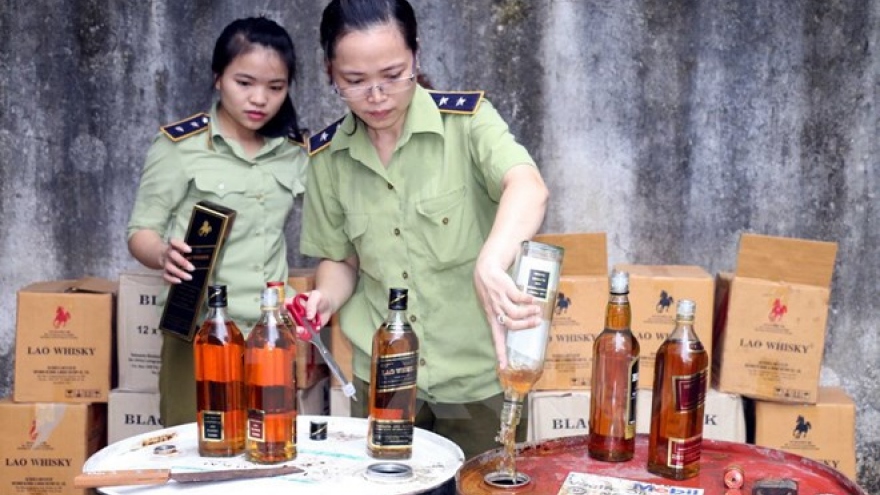Crackdown on counterfeit goods requires full effort of society
VOV.VN - The psychology at work among consumers who prefer to purchase foreign goods rather local items has caused a flood of fake and counterfeit goods to the domestic market and led to difficulties for management agencies in the fight against trade fraud.
 |
Recently, five market management teams in HCM City have checked and confiscated a lot of poor quality and fake goods offered for sale in Ben Thanh market. Counterfeit copies of thousands of luxury foreign brands such as Rolex, Franck Muller, Patek Philippe, Piaget, Montblanc, Chanel, Longines, Dior, Hermes, H&M, and Louis Vuitton have been imported from China.
Local traders say they have purchased fake goods from wholesale markets in HCM City at prices costing just thousands of Vietnamese dongs and sold them on for great profit, with prices ranging from VND100,000 to VND1.5 million for each product.
Poor quality and counterfeit goods have flooded the Vietnamese market, presenting a number of challenges for businesses. At a seminar on the management of fake goods held in HCM City recently, representatives of businesses said that with a population of more than 90 million, the Vietnamese market faces the risks associated with counterfeit and fake goods.
According to some FDI businesses, several of their companies’ products have been copied after being launched on the market.
Jeong Jong Yeon, a representative from Orion Group said Orion’s Choco Pie products have been blatantly copied in their design, package, and brand name. Some establishments have also created the same design of Korean Choco Pie products for export to other nations.
Strengthening inspections and punishments
On the domestic market, fake and poor quality goods are distributed through different avenues from traditional to modern retail channels or e-commerce channels, which facilitate the preponderance of counterfeit goods.
Ms Jaeheon Lee from the Korea Intellectual Service Centre (KISTA), said Korean brands, especially those of small and medium-sized enterprises (SMEs) have been counterfeited, with most of the fake products being cosmetics, medicine, and consumer goods.
Mr Kwanyoung Kim from the Korean Department of Market Management said many buyers acknowledged their purchases of fake goods, noting that they can distinguish goods such as clothes, and handbags but cannot differentiate between genuine and fake cosmetics and pharmaceutical products.
In fact, management agencies have no control over counterfeit goods, as traders use such sophisticated tricks. Nguyen Van Bach, deputy head of HCM Branch of Market Management department said all acts of trade fraud will be punished in accordance with the law and all fake goods will be seized and destroyed.
Mr Bach also noted that the withdrawal of business licenses will be applied to stores which are found committing multiple acts of trade fraud, with further punishment being the termination of contracts to do business at the market.
Tran Hung, deputy head of the Market Management Department, affirmed that management agencies will work with businesses to punish violations of intellectual property rights (IPRs) and tax evasion.
He noted that foreign investors and local businesses can feel secure about doing business in the country as the Vietnamese government has always put the highest priority on anti-counterfeit activities as stipulated in the Ministry of Industry and Trade’s decision on strengthening the fight against smuggling, trade fraud, and counterfeiting.
Mr Kwanyoung Kim also emphasized the need to implement IPR and strengthen the oversight of food items and pharmaceutical products, noting that regulations on punishments should be stipulated within written documents.
According to experts, the legal basis system on IPR in Vietnam consists of the Law on Intellectual Property, the Civil Law and Civil Procedure Code, and the Law on Competition, but regulations on dealing with violations have not been clearly disseminated among businesses.
Due to overlaps in laws and regulations, several businesses do not know how to apply these regulations in a proper manner or where to submit their problems upon finding products which violate IPR.
Deputy Head of the Market Management Department Tran Hung said the department will propose the assigning of tasks to each unit in order to provide greater control over the vast amount of counterfeit goods.


